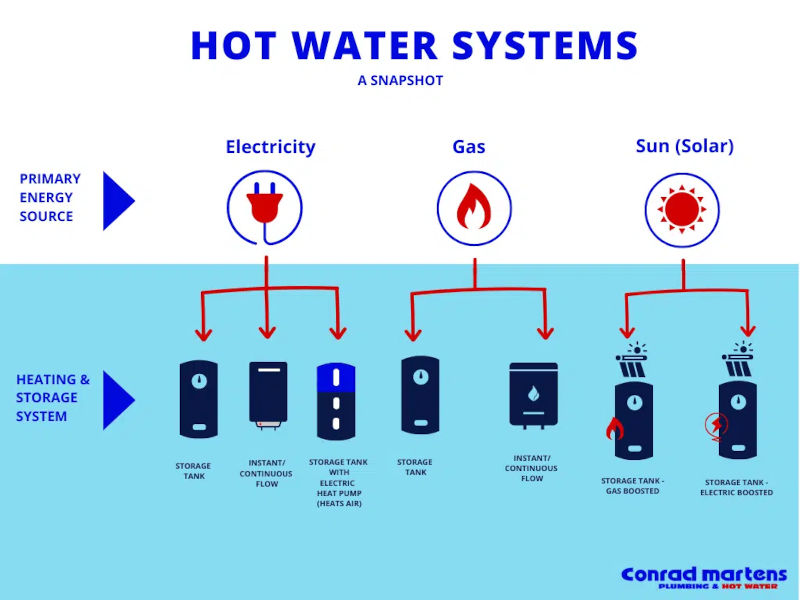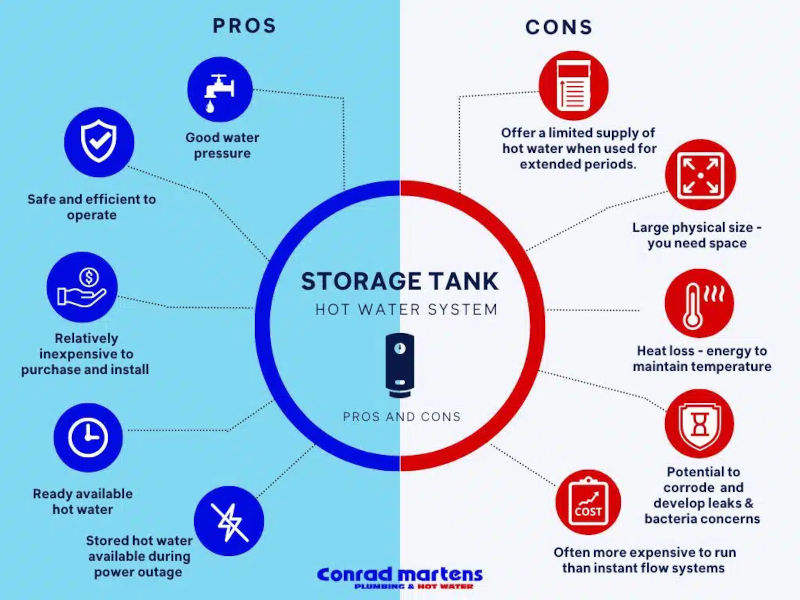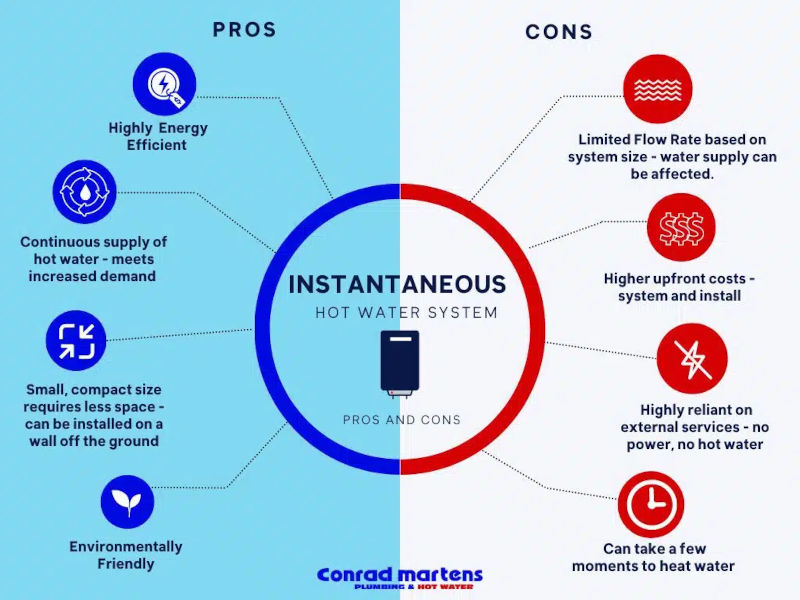

URGENT: I NEED A NEW HOT WATER SYSTEM!
Instant vs Storage Hot Water System: Which Suits Your Home Best?
We all love our hot water. Today’s hot water systems are essential to our modern way of living! There’s probably nothing worse than waking up in the morning or coming in from a long day, ready for your hot shower, only to be welcomed by nothing but icy cold water. Or the kids are a mess with mud or paint but a warm bath is suddenly not an option. Maybe the temperature starts out great but it doesn’t last!
We understand you want a hot water system that’s reliable, cost efficient and durable! One that keeps your world flowing nicely – that fits within your budget and lifestyle.
As a team that focuses on helping our customers with emergency hot water problems and replacements, there are a few questions we get asked all the time:
- What size hot water system will I need?
- Should I get a hot water tank or a continuous flow hot water system? What’s the difference? Which one is the best?
- What about gas versus electric hot water systems? Should I get a gas storage or instantaneous hot water system or an electric storage or instant system?
- What’s the difference in price between an instant vs storage hot water system? Which one is more cost-effective?
With all the different options available, it can be very difficult to know which system would be the best choice for you. In this article we’ll deep dive (yep, there’s a water pun) into the advantages and disadvantages of the two main types of hot water systems – the storage tank hot water system (or more simply, the storage hot water system) and the instantaneous hot water system (also known as an instant hot water system or a continuous hot water system or even a tankless water heater).
We’ll take a look at things like how they work and what you can expect, pricing, size and aesthetics as well as environmental impact. We’ll examine which may be the best system in different situations – because really, the best choice does come down to your home, your lifestyle and what you value most!
Firstly, a quick overview of Hot Water Systems
Hot water systems come in many different shapes and sizes. However there’s essentially two key things that differentiate these systems. The first is the energy source – or what is actually used to heat the water. The second is how the hot water is stored.
Energy Sources
Let’s take a quick look at hot water systems based on their energy source. Water can be heated by three main sources – gas, electricity or the sun (solar energy). There are hot water systems designed for each of these. The right system for you is likely to depend on what energy source you have available at your property or makes sense for your budget and lifestyle. Do you have natural gas available to your home? Do you have solar panels? Is your current hot water system already connected to electricity or gas?
How the hot water is stored
How the water is stored is also another way to compare hot water systems. There are two primary systems to consider here – those with what we call a storage tank (hot water tank), and those that are instantaneous (also known as continuous hot water systems, continuous flow hot water systems, instant or tankless hot water systems).
A visual snapshot of hot water systems in Australia
Check out the image below to see how systems can be grouped based on the main way the water is heated and how it is stored. This is a very high level view. It’s best to speak with your plumber to understand all the options available to you.
Hot water systems in Brisbane
In Brisbane, the main types typically used are:
- Storage tank water heaters (gas and electric),
- Instantaneous hot water systems
In the rest of this article, we’ll take a look at both these different options for hot water systems and when they might be suitable. Hopefully you’ll begin to get a feel for which one might be best for your situation.
Need to get hot water fast?
Please call us now and we’ll be there as a matter of urgency.
We’ve got a brilliant team on the ground right now who’ll give you real, honest advice and a great price. And all our work is 100% guaranteed.
Storage Tank Water Heaters
Storage tank water heaters are the most common hot water systems used today. These systems heat water using an electric element or gas burner and then store this hot water in a tank until it’s needed. When hot water is used around your house (for a shower, dishwashing, laundry, etc) it is drawn directly from the tank. As the hot water is used, cold water fills the tank and will need to be heated during the next heating cycle.
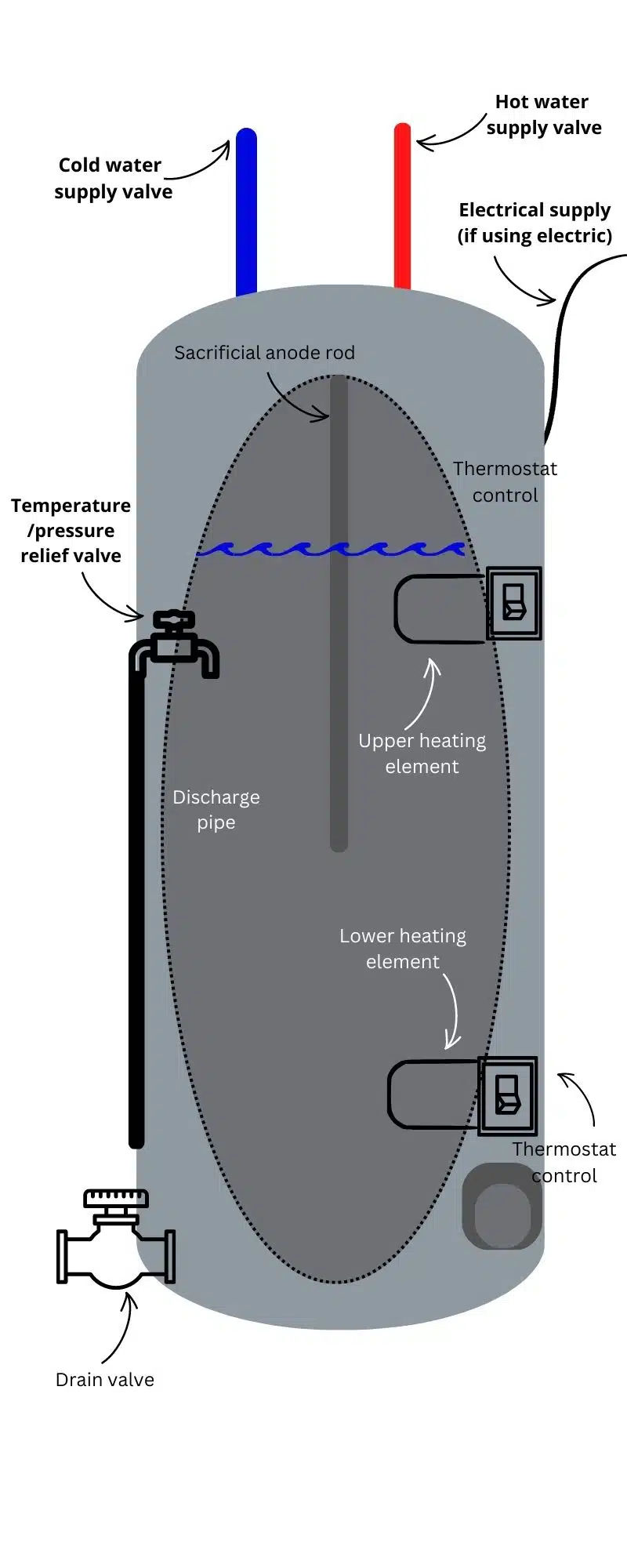
Storage Tank Hot Water Systems heat water using an electric element or gas burner and then store this hot water in a tank until it’s needed. When hot water is used around your house (for a shower, dishwashing, laundry, etc) it is drawn directly from the tank.
The size of this hot water storage tank is a very important factor to consider when using a storage tank water heater. When selecting a system you need to ensure that you have a system which can store sufficient water for your household for showers, laundry and kitchen use as, once this water has been depleted, the hot water system will not produce further hot water until the next heating cycle. Depending on the configuration of your system, this could be the next day. So if you’re a family of 12 or you are forever washing dirty sports clothes, we’d be looking at the larger sizes!
Storage tank hot water systems are available in both electric and gas models and come in a range of sizes from as little as 25-litre units to 400-litre units designed to suit larger homes with greater hot water demands.
Advantages of a Storage Tank Hot Water System
Some of the advantages of a storage tank water heater system, include:
- As the hot water is stored in the system and ready for use, the water can be very quickly available when it is required.
- Generally, storage tank hot water systems are relatively inexpensive to both install and maintain.
- Electric storage tank water heaters have the main heating element internal to the system and are therefore very efficient and safe to operate.
- They don’t require a high flow rate
Disadvantages of a Storage Tank Hot Water System
A big disadvantage of a storage tank water heater can be its physical size. These systems can store up to 400 litres of hot water and therefore can be very bulky. They can take up significant physical space which isn’t always ideal especially in units or townhouses.
Other potential concerns to consider, especially compared to instantaneous systems are:
- Potential corrosion, rust and leaks over time (usually can be alleviated with regular maintenance)
- Energy efficiency and environmental impact
- Loss of heat
Other considerations for Storage Take Hot Water Systems
For customers replacing a storage tank hot water system, it is important to note that regulations for the installation of these storage tanks have been updated in recent years. All hot water systems now require drain lines to be installed on your system valves to discharge water to a drain or downpipe. If your current installation does not have a drain line, this will need to be installed with your new system. This requirement can sometimes mean that the location of the previous system is no longer the best location and additional water piping may also be required.
It is also important to consider what the most efficient and cost-effective way to set up and operate your storage tank is. If you are using an electric system and are operating on different electrical tariff rates, heating your water at different times of the day may make the operation of your storage tank water heater cheaper. As a rule of thumb, small systems generally need to operate for a longer period of time during the day to supply sufficient hot water to meet demand.
Please see the Energex website for information on electrical tariffs.
https://www.energex.com.au/home/our-services/pricing-And-tariffs
For more information on Electric hot water systems and assistance selecting the appropriate size tank for your installation, visit –
https://www.conradmartens.com.au/hot-water-systems-brisbane/electric-hot-water-systems-brisbane/
Here’s a visual summary of the main pros and cons of the storage hot water systems.
Instantaneous Hot Water Systems
Instantaneous hot water systems are also known as continuous flow hot water systems and tankless hot water heaters. These systems do not rely on a storage tank to store heated water. Instead, instantaneous hot water systems heat the water only as it is required. These systems are available in either gas or electric options.
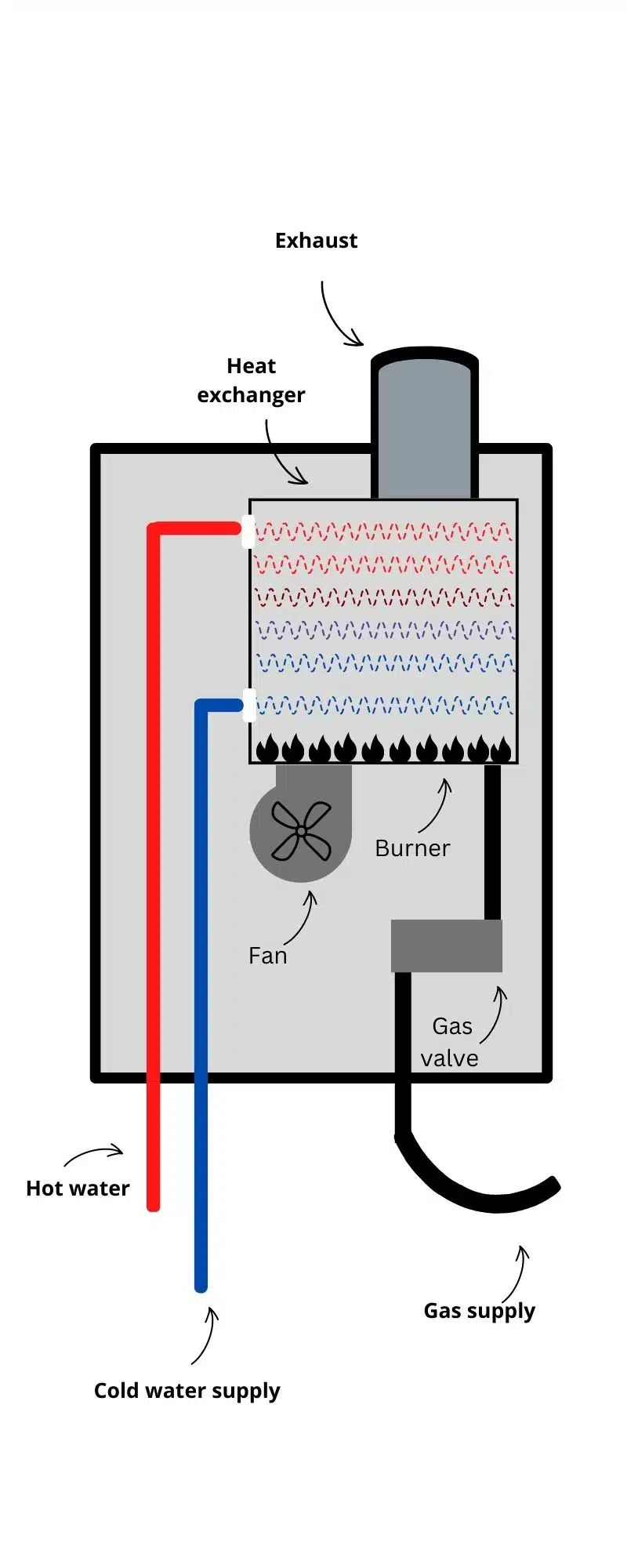
Instantaneous hot water systems are also known as instant or continuous flow hot water systems and tankless hot water heaters. These systems heat water only as it’s needed and have no storage tank.
Advantages of Instantaneous hot water systems
As the water is heated as and when it is needed, the primary advantage of an instantaneous hot water system is that they are capable of supplying continuous hot water to your home. Should demand suddenly greatly exceed normal requirements, an instantaneous hot water system can meet this increase in demand. Instantaneous hot water systems essentially provide an unlimited supply of hot water, as long as there is a constant water flow. A storage tank hot water system by comparison, may not be able to supply additional hot water until the system has had time to reheat the water in its tank.
Another benefit of only heating the water when it is needed is energy efficiency. Storage tank systems constantly heat water, even when it is not in use, resulting in high energy costs. Plus with instant hot water systems there is no heat loss given there is no hot water being stored.
Another big plus for continuous flow or instantaneous hot water systems is their compact size. As these systems are not required to store the heated water, these systems are physically smaller than storage tank water heaters. Due to this smaller physical size, they are increasing in popularity for many unit and townhouse installations. In many cases, instantaneous hot water systems can even be mounted on a wall and off the floor.
Continuous flow hot water systems are also relatively easy to maintain. As they don’t store water they don’t have the issues of corrosion and leaks like the storage tanks. Parts are also relatively easy to replace.
Some of the disadvantages of Instantaneous hot water systems
One of the disadvantages of an instantaneous or continuous hot water system is that they continuously rely on additional external services. If you experience an outage of any services to your property (water, power or gas), your instantaneous hot water system would be unable to produce hot water for you. And because you don’t have a tank full of hot water, you will have to wait until the services are back on.
While they are referred to as instant or instantaneous hot water systems, these systems take a few short moments for the water to heat up, unlike a storage tank where the hot water is readily available.
Finally, they can be a little more expensive to install than storage tank hot water systems.
Other considerations for Instantaneous hot water systems
The capacity of an instantaneous hot water system is measured by the amount of hot water the system is capable of producing. A 24 litre system for example is capable of producing 24 litres of hot water each minute. When selecting your instantaneous hot water system, you will need to ensure that your system can produce enough water for your requirements. As a general guide, a small unit dwelling with a single bathroom may find a 12-litre system is sufficient while a sizable home with multiple bathrooms or larger families could require a larger system capable of producing 27 litres per minute.
If you need a system that supports a higher volume it is also important to ensure that the gas and water piping supplying the water heater are able to provide sufficient volume to the system.
Gas versus Electric Instantaneous hot water systems
Electric instantaneous water heaters are often cheaper to supply but installation can be expensive as they will often require an electrician to run a dedicated electrical circuit. These systems can be advantageous in specific situations where a gas system is not appropriate.
An electric system would typically be installed in the following situations:
- When you are not able to run the hot water lines from a central unit to the kitchen or the kitchen is located a long distance from the bathrooms in a larger home.
- The unit is not able to be supplied with sufficient ventilation which would be required to run a gas system.
- When space is extremely limited. The smaller size of an electrical system can allow them to be installed where other systems will not fit. Eg – under a kitchen sink.
- A gas supply is not available.
- Electrical systems can be installed where required without many restrictions. The installation of gas systems is highly regulated and requires good ventilation and clearance from combustible materials. This limits the location in which gas systems can be installed.
We have more information on instant gas hot water systems on our website. You can find this information here.
Storage versus instantaneous, what is the best hot water system for me?
There is no one best hot water system for everyone. The best system for you depends on a number of factors and your individual circumstances.
In the table below we’ve summarised the key differences between Storage and Instantaneous systems.
Consideration Factor
Storage Tank Hot Water System
Instantaneous/continuous flow hot water system
Capacity/ Ability to meet demands
- Range in sizes to suit different household sizes and demands
- Ready supply of hot water
- Hot water supply (the amount of hot water it can produce) is limited to the size of the tank
- Can take a while to heat the water (especially larger tanks).
- If services are down (power, water supply), still have tank full of hot water
- Range in sizes of capacity – measured by the amount of hot water the system is capable of producing.
- Can provide an unlimited supply of hot water, as long as there is a constant water flow.
- Can take a few moments for the water to heat up (not always ‘instant’)
- As it doesn’t store water, if services are down, no hot water.v
Water pressure/flow rate
- Offers good water pressure
- Doesn’t require high flow rates
- Can require higher flow rates
- Tends to have lower pressure than storage tank
- Water supply can be affected if you have low-flow showerheads.
Size & location
- Large tanks that require significant space and good ventilation
- Must be placed on the ground
- Best to locate in warm or sunny location to reduce heat loss
- Small and compact – do not require significant storage space as they heat water on demand and do not store water.
- Great for smaller apartments or townhouses
Energy efficiency
- Heats water even when it’s not required
- Can make use of lower tariff times to heat water
- Potential heat loss – energy required to maintain water temperature
- Only heats water when a hot tap is turned on and only heats the amount of water that is required instead of continuously heating a full tank.
- Heats water across all tariff times.
- As they don’t store any hot water, there is no heat loss from a tank and so can have energy and cost savings.
Installation costs
- Relatively less costly to install than instantaneous hot water systems.
- Typically it takes a little longer to install and set-up than a storage hot water system.
Upfront cost of the system
- Typically less than a continuous hot water system
- Typically higher upfront cost than a storage tank hot water system
Durability and Maintenance Costs
- Warranties on the cylinder range from 7 – 10 years for gas and up to 12 for electric.
- Can last up to 10- 15 years – Life expectancy depends on many factors including water quality and maintenance.
- Internal components are prone to wear and tear.
- The hot water temperature needs to be maintained at or above 60 degrees celsius to prevent the growth of bacteria
- Keep system maintained to avoid corrosion/rust and leaks and maintain temperature
- Warranties on the heat exchanger (component which heats the water) range from 10-12 years for domestic systems.
- As it doesn’t store water, it is less likely to suffer from corrosion and leaks.
- These systems can last up to 20 years and the parts are usually fairly easy to replace.
- Doesn’t require the water temperature to be 60 degrees celsius or above.
Ultimately, when considering your new hot water system, it is important to consider the following when deciding which one is best for you:
1. THE DEMAND FOR THE HOT WATER!
It’s important to purchase a system that will meet the demands of your home but will also not be too big that you waste money!
• The number of people in your household
Usually the larger the household, the higher the demand for hot water. For example, if there are a number of people in your home and they usually have consecutive showers, you don’t want the water to run out at number three or four! Or maybe you regularly have large washing loads. In these scenarios an instantaneous may be best as you will effectively never run out of hot water (it will ‘continuously flow’). Alternatively you could consider a larger storage unit. It really does come down to how much you use on a daily and weekly basis.
• The number of services/rooms within the home which require hot water and their location
How many rooms in your home require hot water – kitchen, butlers pantry, laundry, bar room etc? Will they require hot water at the same time? If you have multiple rooms in your home that need hot water you need to consider a hot water system that can meet these larger requirements.
2. YOUR PREMISES INCLUDING HOME DESIGN – STYLE & SERVICES AVAILABLE
• The space available to install a hot water system
There are a number of different sizes of both storage and continuous hot water systems. Continuous systems offer some of the smallest hot water systems on the market. They sit flush against a wall and also sit up off the ground – meaning they are much less noticeable than a large storage tank and usually take up much less space.
• Aesthetics – how the system will look
Home and interior design is big business. Over the past couple of years our homes and how they make us feel has become increasingly important! We all have a personal style and a vision for how our home should look and function.
The size and look of your hot water system needs to fit within that vision. You need to consider things like whether the system is inside or outside and where it is specifically located. Can it be viewed easily or is it hidden from view? Is your home traditional or modern and streamlined? Do you need the system mounted on a wall and off the ground?
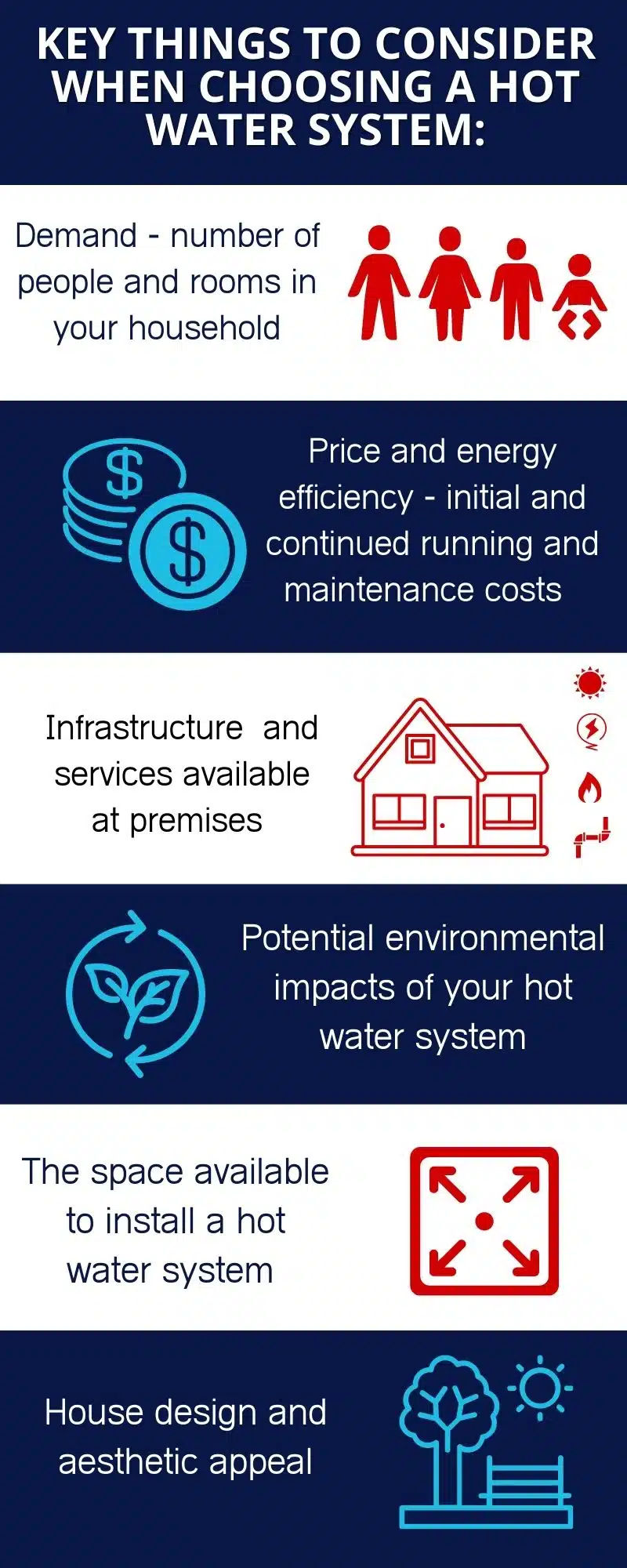
• YOUR BUDGET – THE TOTAL PRICE/COST OF THE HOT WATER SYSTEM
What energy source is actually available at your place? Gas, electricity or solar? Natural gas? There are both gas instantaneous hot water systems and gas storage systems. Similarly you can get electric continuous hot water systems and electric storage systems. The best system for you may simply come down to what is available to heat the water. Stay tuned for our coming blog on the difference between gas and electric hot water systems.
3. YOUR BUDGET – THE TOTAL PRICE/COST OF THE HOT WATER SYSTEM
• Upfront price and installation costs of your hot water system
As shown above, some systems may cost more upfront but offer energy savings over the life of the hot water system. Other systems offer a cheaper price upfront and easier installation
• Running and maintenance costs
As stated above, the continuous hot water systems are known for their high energy efficiency. As they only heat the water when needed you can potentially save money on your energy bills over the life of your system.
Storage tanks can also offer efficiencies by heating the water in lower tariff times. You can also ensure you purchase a tank that offers the perfect amount of hot water for your family so you’re not heating water that you don’t need.
4. THE HEALTH OF YOUR FAMILY & YOUR PLANET
• Environmental impact
Are you concerned about potential environmental impacts your new hot water system may have? Instantaneous hot water systems are considered more environmentally friendly as they produce less greenhouse gas emissions compared to storage tank systems. Solar is also another option. Check out our page on solar hot water systems.
• Water quality
With an instantaneous hot water system, water flows through the system when needed and not stored. When it comes to storage hot water systems, there is the potential for bacteria to grow in the cylinders. Regular maintenance is therefore important to ensure the water temperature is correct and maintained, and water is not sitting stagnant. It helps to buy the right size tank for your requirements.
If you’d like some expert and honest advice on which hot water system to install for your particular situation, please reach out to us. As a preferred plumber by the big brands in hot water systems, Conrad Martens Plumbing and Hot Water Team are ready to provide you with the best price, service and advice.
To ensure safety, reliability and efficiency, it is the law that all hot waters systems must be installed by a licensed technician and registered with the council. We can have your new hot water system installed and operating in no time. Call (07) 3878 4444 and we will be ready to assist you.
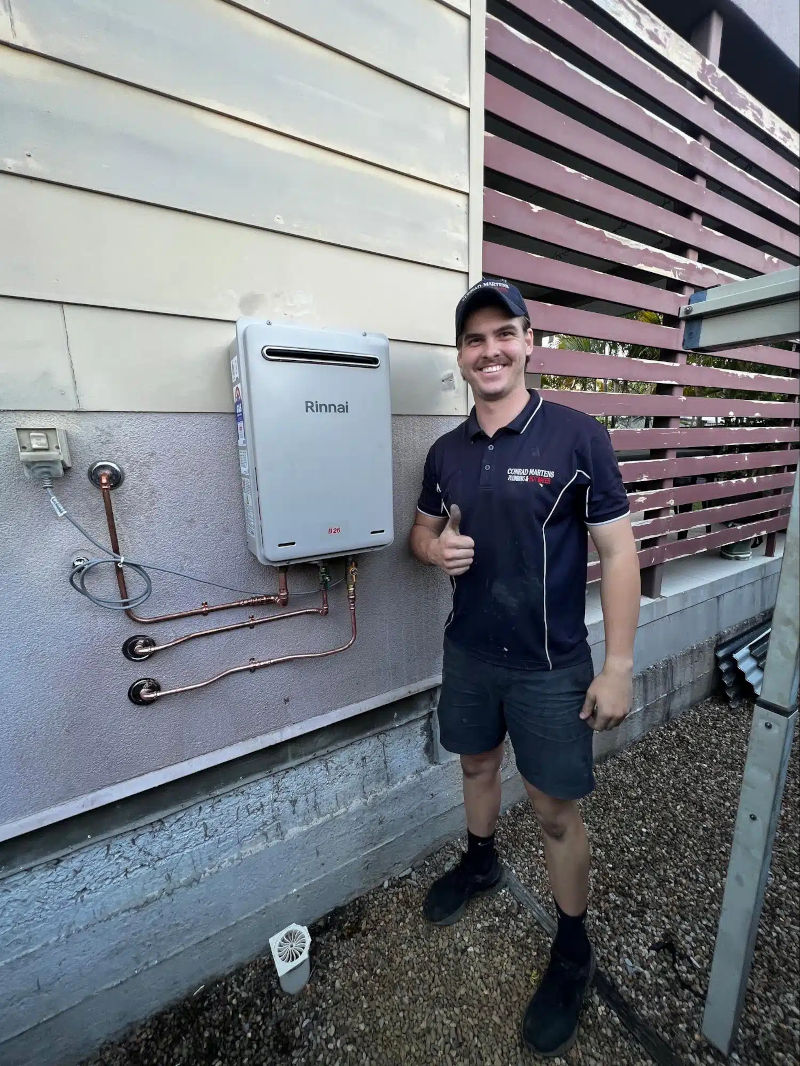
Yours in keeping the good life flowing!
The Conrad Martens Team
For the best price, service and advice!

